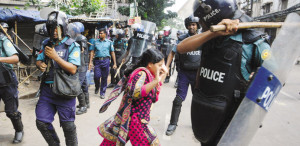Συγκρούσεις στο Μπαγκλαντές και νέος “αντιτρομοκρατικός” από το κράτος (από τον αστικό τύπο):
Bangladesh police yesterday fired rubber bullets and tear gas at thousands of garment workers protesting for better benefits in the capital Dhaka.
The clashes occurred in Dhaka’s Tejgaon industrial area after about 5,000 workers from Utah Fashions went on the rampage when they found the owners had closed the factory rejecting their demand for a hike in lunch and attendance bills.
“They staged a sit-in blocking a road. The factory management and police have asked the workers to clear the road. But they became unruly and smashed vehicles and factory windows,” local police chief Monir Uz Zaman said.
The protesters were dispersed after “police fired rubber bullets and tear gas at them,” Zaman said, adding several people were injured.
Police in Dhaka Medical College Hospital said at least one worker was brought into the hospital with injuries from a rubber bullet.
In a separate but similar incident in Gazipur district north of Dhaka, up to 2,000 workers from the Uni Gears factory clashed with police after the authorities shut the plant indefinitely.
“The workers blocked a key highway and threw stones at police. We fired tear gas to disperse them,” Gazipur police spokesman Mosharraf Hossain said.
Hossain said the owners closed the plant following days of protests by the workers demanding increases in perks and bonuses.
Bangladesh’s $20bn garment industry, the world’s second largest after China, has witnessed weeks of labour protests over pay hikes and better safety since a massive building collapse killed 1,129 factory workers outside Dhaka in April.
The government last month set up a panel to raise the minimum wage for millions of garment workers, as tens of thousands walked out of their factories and fought street battles with police.
A series of tragedies since November have highlighted appalling safety conditions in Bangladesh’s 4,500 garment factories and triggered renewed scrutiny of “made-in-Bangladesh” clothes commonly sold in the West.
Bangladesh amends anti-terror law
Agencies/Dhaka
Bangladesh’s parliament has amended the tough anti-terrorism law redefining “terrorism” and allowing courts to accept Internet materials as evidence, amid protests from opposition which feared it was designed to target them.
“The (anti-terror) bill suggests provisions to effectively control terrorism through inter-state co-operation. It offers the central bank the authority to freeze suspicious accounts without court orders,” Home Minister Mahiuddin Khan Alamgir told the parliament as law was passed overnight.
The law was first enacted in 2009 when the incumbent Awami League assumed office after the December 2008 elections while it was amended last year incorporating some
provisions.
But officials familiar with the drafting of the law said the fresh bill, which now awaits routine presidential assent, was also required to overcome “some shortcomings” particularly in areas of inter-state co-operation and checking terror financing.
They said the new law tended to redefine the term terrorism incorporating the wider issues of cyber crime and law enforcement agencies now could submit as evidence Internet chats and images. “You must have witnessed changing patterns of terrorism using Internet while people are being burnt to death inside passenger buses. What is the wrong in enacting a law to prevent crimes,” Law Minister Shafique Ahmed said.
Main opposition Bangladesh Nationalist Party (BNP) briefly walked out of the House as the bill was passed in voice vote.
BNP called it a “black law” to control the opponents while the provisions of the law were “contrary to the constitution.”
“The law will be used to snatch people’s human rights, basic rights and constitutional rights. It has been formulated in a bid to add a new dimension to their (government) ongoing repressive acts against the opposition and intensify their repression further,” BNP leader Maudud Ahmed told the House.
But the law minister said he was surprised why the opposition was frightened when the law was amended to deal with the newer dimensions of terrorism and “its (opposition allegation) sounds like robbers are saying why anti-robbery law is being enacted.”
Home Minister Alamgir said the law was not framed to target the opposition. “I want to hold out the assurance that no gentleman or gentlewoman will be harassed under the law,”
Alamgir added.
